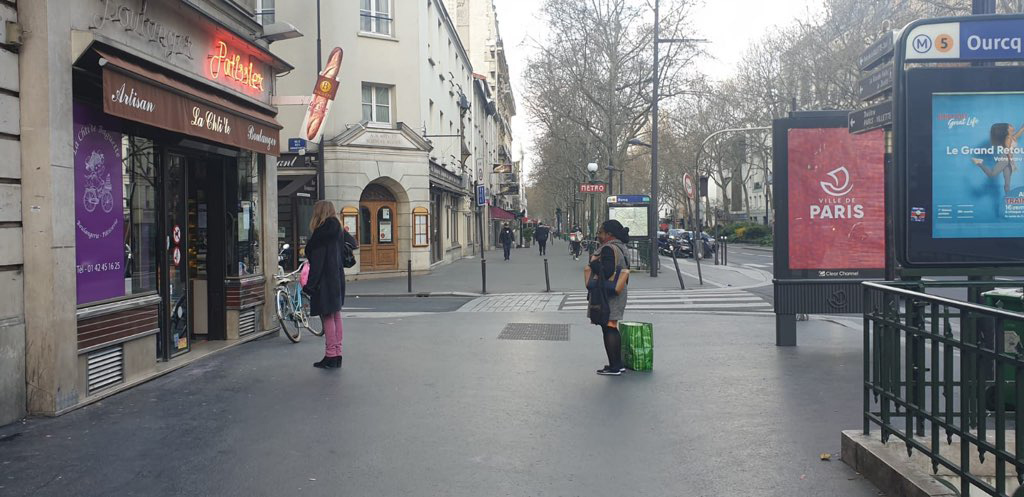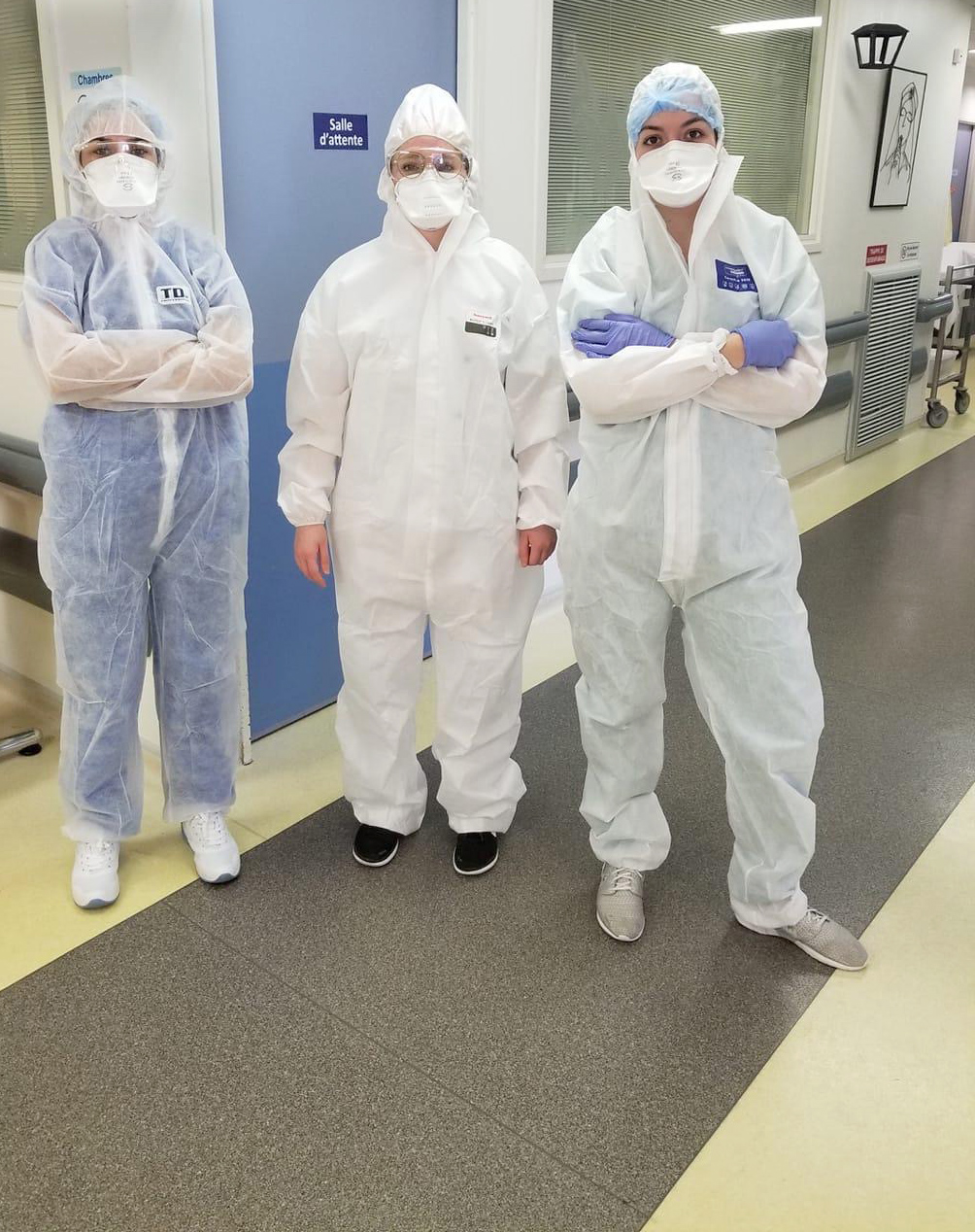Across the U.S., protesters started demonstrating in recent weeks against stay-at-home orders and business shutdowns.
But in France, where President Emmanuel Macron declared a “public-health war” against the coronavirus early in March, citizens have expressed mixed emotions toward quarantine restrictions. While some want more freedom, others want even tighter restrictions to ensure limited spread of Covid-19.
Residents of France are only allowed to leave their homes for an hour each day to exercise or get groceries. And they are supposed to stay within one kilometer of their homes.
What’s more, the French are encouraged to take a piece of paper with them each time they leave their homes to write down the time they left and their reason for leaving – just in case they are stopped and questioned.
Here is a brief look at how three very different residents of France are coping.
~

Eleanor Beardsley was walking along the Seine river on what could be considered an ordinary spring afternoon in Paris.
Except it wasn’t by any means ordinary — the streets and sidewalks throughout the usually bustling metropolis were empty, as was the quai, the French word for platform or dock, along the river in early April.
As Beardsley was walking along the quai, a police boat rode down the river with an officer holding out a megaphone and shouting at each person who passed: “The docks are prohibited!”
Suddenly, Beardsley, National Public Radio’s Paris correspondent whose voice is familiar to millions of listeners across the United States, said she felt as if she lost the one ounce of freedom she had left as the coronavirus epidemic completely shut down Paris — access to the path she regularly walked for an hour each day.
In an interview in early April, Beardsley said she felt the big city of Paris getting “smaller and smaller” and the restrictions getting “tighter and tighter.”
Her 14-year-old son and her husband have also been confined to their home during quarantine, since schools throughout France are closed.
Beardsley, who started freelancing for NPR in June 2004, has been recognizable part of the European reporting team ever since.
Since the quarantine restrictions have been in place, she has taken an hour each day to walk the radius surrounding her home, noting the aura of what seems like an entirely new environment.
“The silence is deafening sometimes,” Beardsley said.
One pleasant diversion: as she walks along the river, she said she can hear birds chirping as opposed to the usual stir of motorists on the streets.
Beardsley has found herself struggling to do her job as a radio reporter since the start of the coronavirus pandemic.
Typically, she reports on breaking news throughout France and Europe. She has covered events ranging from the Tour de France to the French elections to the Gilets Jaunes protests last year. Since the coronavirus pandemic has worsened, however, the Covid-19 story has become the sole topic to cover as a journalist.
She said she uses a long microphone that she can attach to a long pole to talk to sources in-person for radio stories. She did that recently for a story on bakeries remaining open throughout Paris.
But for most of her stories, Beardsley has had no choice but to interview sources remotely. She has found herself writing web stories more than recording radio stories.
“You’re supposed to go out and bring scenes and sights, and smells and places, and it’s just not the same when you call people up on the phone,” Beardsley said. “I think the chances to do reporting are greatly diminished. Everything is being monopolized by Covid.”
She said the most difficult part of reporting during these times is finding a unique angle, as the same news is happening all over the world, not just in France.
Beardsley said she starts each day with a conference call that includes NPR’s 17 foreign bureaus and other international correspondents. As they have always done, they talk about different angles and stories, always trying to report on important international events as they relate to an American audience.
“When I was reporting on the Arab Spring, I was in Tunisia, and they wanted everything because it was happening there,” Beardsley said. “This is happening everywhere, so you don’t necessarily want to report from France every day … you’ve got to come up with something different.”
A story unique to France was its use of high-speed trains — known as TGVs (for Train à Grande Vitesse) to the French — as emergency transportation to bring patients from overwhelmed areas of the country to regions with more accessibility and space in hospitals.
“We’re impressed by the high-speed trains, period,” Beardsley said, “but turning them into emergency rooms — that’s really impressive.”
The system started by transporting 20 patients from the east of France to the west, with trains fully equipped with medical personnel and supplies.
She said NPR has been very cautious and supportive of its reporters during the crisis. Beardsley wanted to go to a train station to do another story on the emergency transport trains, and NPR was hesitant to let her do so for her own safety.
When reporting on other major crises, such as terrorist attacks in Paris in 2015 and the Arab Spring revolts in Tunisia in 2011, Beardsley said she never felt scared or very personally affected — but the coronavirus has been different.
“This is weird because you’re living it and covering it,” Beardsley said. “There’s nowhere in the world you can go to get away from this. That’s the weirdest thing. None of us have ever done that.”
She said it can be hard to find motivation to write stories when she cannot go out and experience them as she normally would.
“When you have a really gray day, it can seem very grim — then you have to remember you’re not on a ventilator in a hospital, so you’re doing fine,” she said.
~

Tifani Soulier works at l’Hôpital Saint Camille in the suburbs east of Paris as an aide-soignant, a nurse’s assistant. She works 12-hour days most days of the week.
Each morning, she goes into the hospital to suit up in extensive personal protective equipment before starting her day of work.
Soulier said one of the hardest parts of working in this environment is the discomfort of the PPE — she said it is hot and difficult to breathe when equipped with such attire.
Soulier has also increased the time she needs to spend with each patient. She said visiting 20 patients used to take an hour, but now she sees about 10 patients every two hours.
After each visit to a patient, Soulier must completely disinfect everything she is wearing and equip herself with new, sterile PPE.
She can also no longer pop in and out of a patient’s room, either. Each visit to a patient is used to its full advantage, helping them to bathe and providing food and medicine to avoid going back and forth in order to minimize the spread of COVID-19.
As a nurse’s assistant, Soulier is not allowed to see patients on her own during the pandemic — she must always be accompanied by a nurse or doctor. About 70 percent of her hospital’s work is dedicated to COVID-19 recovery, she said.
Soulier’s mother, Pascale Guibout, who translated this interview with Soulier in early April, said she admires the work of her daughter and other medical personnel during this trying time.
“A lot of people are depressed, because Tifani is counting a lot of deaths every day, people dying from the virus,” Guibout said, as her daughter spoke in French. “There are still people dying from other diseases … of course.”
Soulier said it is stressful for her and other medical professionals working through this crisis, because they, too, are scared of getting infected.
“It’s hard for a young girl like Tifani who is only 23 years old to be around that amount of [death],” Guibout said.
Guibout is a single mother to Soulier and 18-year-old twins, and since Soulier is working so closely with coronavirus patients, the twins have been staying with their father for the past month.
Both Guibout and Soulier have been remaining as isolated as possible. Guibout said because of her daughter’s work in a hospital, she only leaves to go to the grocery store once a week.
“I trust her because I think she does everything she needs to do, but I’m worried for her,” Guibout said.
Soulier added that even before coronavirus, working conditions for medical professionals in hospitals were not ideal, and many hospitals had gone through strikes. She said these conditions have not improved during the coronavirus pandemic.
She said as more doctors and nurses are getting infected with the coronavirus, the work needed from healthy health care workers continues to grow harder.
~

Penn State student Timothée Valentin is now living with his parents in the small northern town of Saint-Quentin, after studying, researching and teaching in the United States since 2015.
For five years, Valentine has been pursuing his Ph.D in French and Francophone Studies, while also teaching French language and conversation classes to undergraduates at the university.
Because he was not scheduled to teach this spring semester, he has been in France since December.
During an interview in early April, he said the sights of a small town in France during the coronavirus pandemic are not much different from those in the U.S. – quiet with few people and cars out in public.
Saint-Quentin is a small town about 100 miles north of Paris. Valentin said that his area of France is not so severely affected by the virus as other parts of the country, such as Paris and the Alsace region in the east.
Valentin said the stay-at-home orders throughout the country have made living so much different from what he remembers on previous trips.
“Whenever I go back to France, I usually take time to go around [the country],” he said. “I’m kind of bored inside because I want to move around.”
He had managed to travel to Paris earlier in the year, but he had to cancel plans to do research in the south of France because of the coronavirus.
While he is not currently teaching at Penn State, he has academic obligations. Valentin said he still needs to find time to work on his dissertation during his time quarantined. His dissertation focuses on the political history of French Caribbean island Guadeloupe between 1890 and World War I.
“I have a hard time just [trying] to focus on what I’m doing, because it doesn’t seem very important compared to what’s going on outside,” Valentin said.
Valentin’s father continues to work as a family doctor. Because he is not working in a hospital, Valentin said, he has not seen a high number of coronavirus patients. Nevertheless, he is still taking the standard precautions.
Valentin described his father as “kind of a first layer in the medical chain.” If he is presented with a patient who has coronavirus symptoms, he said, he typically directs him or her to a larger hospital. He said when the severity of the pandemic started to heighten, his father saw fewer patients as people were encouraged to avoid doctor visits unless absolutely necessary.
Valentin decided to pursue his degree at Penn State because he had a friend refer him to the program. He said it was the only place he applied.
“Five years after, I have zero regret,” Valentin said.
Valentin is supposed to return to State College next semester to continue his program, but he is unsure exactly when that will happen. He said he is taking the situation day by day.